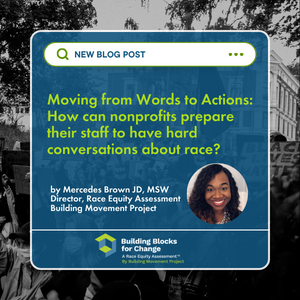Mar
19
2024
by Mercedes Brown, Director, Race Equity Assessment, Building Movement Project
Three years have passed since many nonprofit organizations began to make a more concerted effort to become more racially equitable and, at first glance, a lot has changed. But if you pull back the curtain, has it?
Despite new efforts to become more racially equitable, employees reported through our Race to Lead survey that they feel just as unprepared to have conversations about race and social inequity as they did in 2019. They also don’t know how to productively address the tensions that these conversations bring up.
A diverse array of employees from across the country participated in the triennial Race to Lead survey– in 2016, 2019, and 2022- and the results help us understand how nonprofit organizations approach race and leadership, what progress has been made, and where additional changes are still necessary. In the latest survey, 83% of nonprofit employees stated that their organizations engage in diversity, equity, and inclusion (DEI) activities, an increase from our survey in 2019. However, the increased focus on DEI efforts may have uncovered new problems.
The inability to effectively navigate difficult conversations and shift from conflict to productive action lies at the heart of the stagnancy we’ve seen in our research and the frustration that many employees of color feel. We’ve found that the organizations where employees of color are happiest are those where they feel the most heard and where they see leaders take productive action from their conversations. So then how can organizations more effectively move from words into actions?
Based on years of research, our team identified four core capacities: learning, leadership, conversation, and voice which lay the building blocks for organizations to become more racially equitable. These capacities informed and are at the core of the race equity assessment we developed, Building Blocks for Change – a tool for nonprofits to understand their internal culture and identify opportunities to become more racially equitable. While the survey assesses organizations in all four areas, the one that stands out as a key starting point is building the capacity to have difficult conversations.
Through an analysis of data from completed Building Blocks for Change assessments, we identified a key set of skills that are often underdeveloped and that must be present to effectively hold conversations that help organizations become more racially equitable:
- Building trusting relationships:
Employees reported they don’t feel their organization has effective processes in place for staff to raise concerns regarding race equity issues. Staff members of all levels must build trusting and resilient relationships in which they individually and with colleagues feel empowered to discuss their thoughts and feelings across differences. By regularly creating time and supporting skill-building for staff members to understand each other better and build trusting relationships, they are more likely to feel comfortable engaging in difficult conversations in the future. This is counter to the usual approach of using these conversations as a method of building strong interpersonal relationships. In reality, that foundation needs to be set much earlier and must be built into the organizational culture so staff members have the skills to continue strengthening their interpersonal relationships over time.
- Handling conflict:
Employees revealed their organizations often struggle with having difficult conversations and don’t have effective conflict-resolution processes in place. Leaders must develop a process to handle conflict productively. Based on the knowledge that every person is different, all team members must understand that conflicts can (and will!) arise and can be an opportunity for growth. Whether this means ensuring that conversations about race equity are better facilitated or holding more trainings so employees become more comfortable talking about race, creating a regular practice for effectively managing conflict will also help staff members trust in the strength of the organization to withstand disagreement and feel safe bringing up struggles they may be facing.
- Ensuring accountability:
BB4C respondents don’t believe their internal conversations about race equity seldom move beyond identifying problems and they often fail to develop solutions. To move from conversation and potential conflict into action and progress, organizations must also create mechanisms for accountability – not only on the individual level but on the organizational level. Leaders should engage in a rigorous process of goal-setting with clear timelines and reporting processes to demonstrate how difficult conversations result in tangible change. Accountability also includes providing channels for staff members to provide honest feedback and assess any new strategies to further racial equity to ensure they are effective.
To create meaningful change, organizations must be prepared to engage in challenging conversations – an area we found in our data to be one of the biggest sticking points in racial equity efforts. These discussions are essential to establish a strong foundation and identify effective ways to advance race equity in the workplace. Building trusting relationships, having effective conflict resolution processes in place, and holding teams accountable are a starting point for leaders who hope to begin or deepen their work to increase racial equity and change their organizational culture. Becoming more racially equitable isn’t just a box to check off a to-do list, but an ongoing practice. Assessing how well your organization approaches challenging topics, and building a way forward based on those insights is the first step towards propelling you toward new solutions. To learn more about the Building Blocks for Change race equity assessment tool, set up a one-on-one meeting with our team today.
Mercedes Brown is the Director of the Building Blocks for Change Race Equity Assessment, a part of the Building Movement Project.

